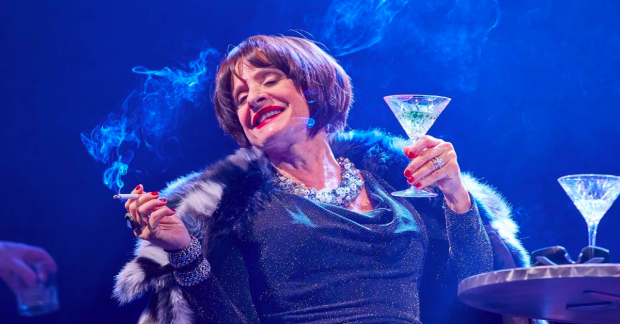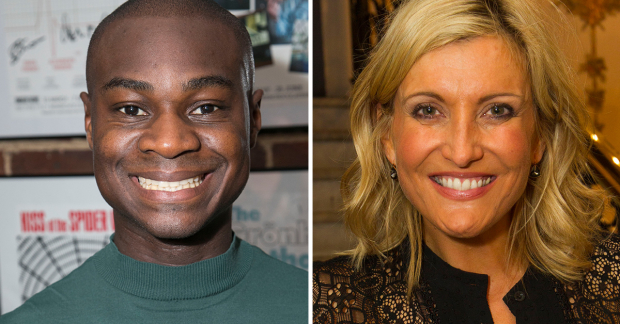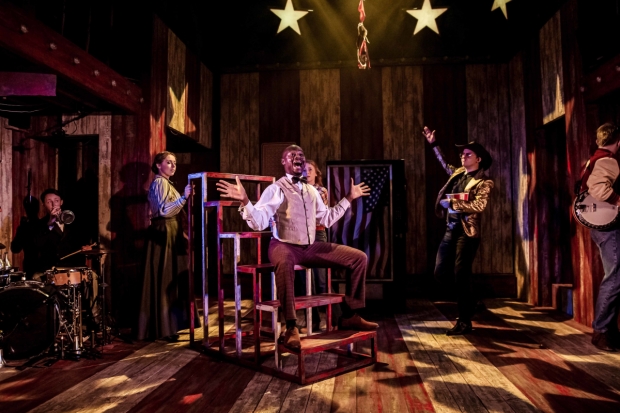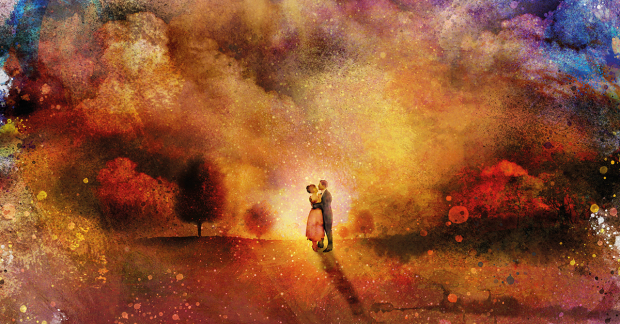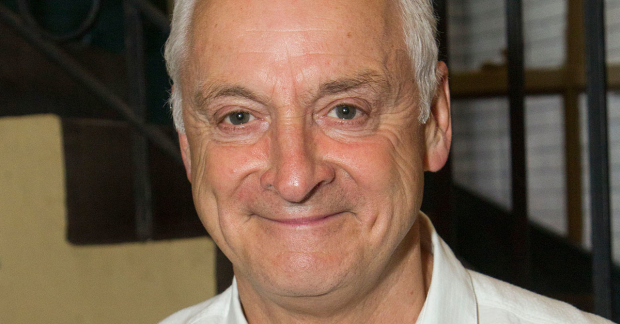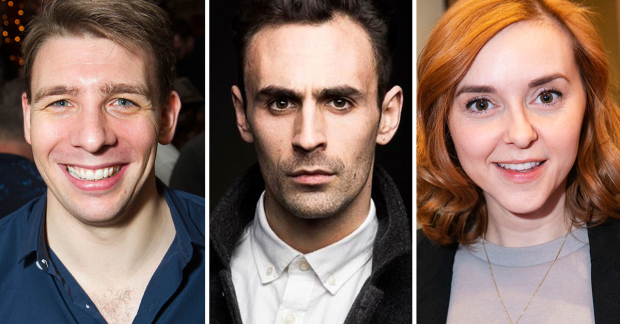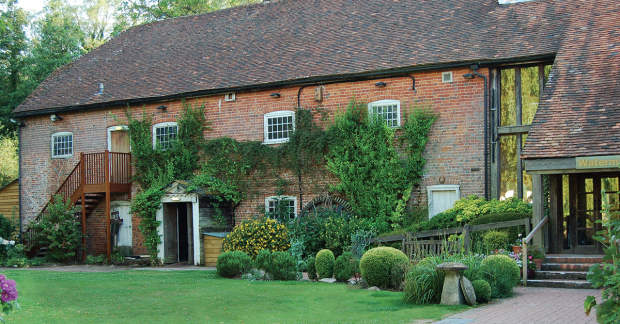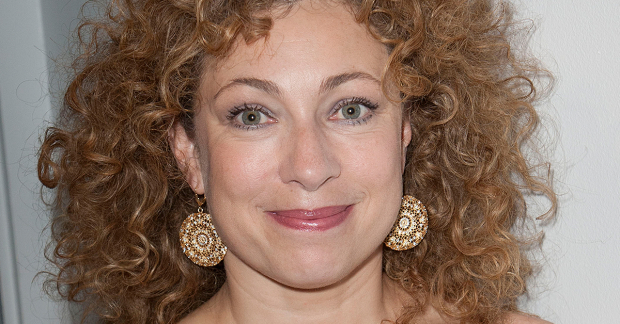Review: Assassins (Watermill Theatre)
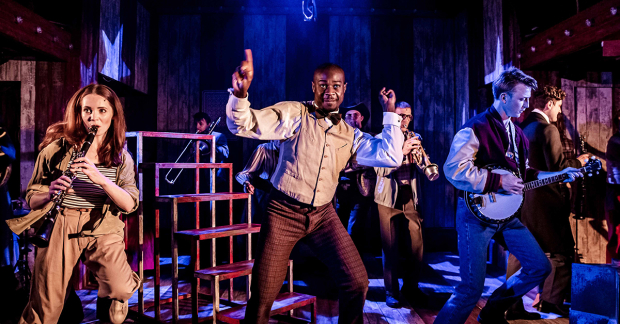
© The Other Richard
It was almost 30 years ago that Stephen Sondheim and book writer John Weidman's line up of murderous misfits first confronted an off-Broadway audience in a helter-skelter ride through the dark recesses of their minds and motives. The pitch-black comedy of the duo's revue-style musical has an added dimension in today's world, where making instant connections to like-minded tribes is frighteningly easy.
So bringing together the executioners, successful and would be, from over a century of American history in one chorus line has a new resonance. The intimate space of the Watermill (the show will transfer to Nottingham Playhouse later this month) is suddenly uncomfortably claustrophobic as, guns levelled, the gang eyeball their audience and execute (no pun intended) choreographer Georgina Lamb's out-front, assertive moves.
Bill Buckhurst's production is at once laugh-out-loud funny, deeply thought-provoking and disturbing. The winning combination of actor/musicians works its usual magic, with a wonderfully cast bunch of multi-talented performers embodying these frighteningly convincing outsiders, each triggered by their own grievances, obsessions and delusions.
Joey Hickman's Proprietor reels 'em into a sinister fairground shooting range with his wicked smile, showman's patter – and proffered selection of firearms. Thus America's deadly insistence on legally available guns for all is centre stage from the get-go.
Starting with John Wilkes Booth's spectacular elimination of Abraham Lincoln, the action moves back to Wilkes Booth and then forward to John Hinckley's mercifully unsuccessful attempt to see off Ronald Reagan. It then climaxes with arguably the most high-profile assassination of all: the disparate band crowd round Lee Harvey Oswald, urging him to unite and justify them all by setting his gunsights on President Kennedy from that Dallas Book Depository vantage point.
The contrast between Alex Mugnaioni's loquacious thespian Wilkes Booth and Ned Rudkins-Stow's repressed time bomb of a Lee Harvey Oswald is one of the show's highlights. Every assassin demands equal attention though: Peter Dukes is actually sympathetic as Leon Czolgosz, the Polish anarchist who did for William McKinley in 1901, his demands for rights for downtrodden workers like himself dangerously inspired here by obsessional love for anarchist Emma Goldman (authoritative Phoebe Fildes). Zheng Xi Yong, as the Italian-born US immigrant Guiseppe Zangara who missed Franklin D Roosevelt in 1933, vividly reveals the chip on his shoulder left by the sufferings in the Great Depression that he blames on the President.
Samuel Byck's failed attempt to eliminate Nixon by flying a hijacked plane into the White House has a special chilling relevance post-9/11. Dressed as a dishevelled bad Santa Claus, Steve Simmonds invests him with a crazed malevolence. Sondheim's dark humour has him seeking attention from composer Leonard Bernstein, quoting from West Side Story's "Tonight" – words written by none other than Sondheim himself of course.
The only women would-be assassins provide an alarmingly funny double act of gun-toting gals. Sara Poyzer's jovial, awkward would-be ‘hockey mum' Sara Jane Moore and Evelyn Hoskins' unhinged Lynette 'Squeaky' Fromme, Charles Manson's crazed groupie, demonstrate how they failed spectacularly to bring down President Ford in 1975.
Jack Quarton is frighteningly convincing as John Hinckley, embodying the obsessed stalker of star names, trying to get the attention of Jodie Foster by shooting Ronald Reagan, but succeeding only in being certified insane.
Perhaps the loudest voice in this litany of cries for attention from a cruel unfeeling world is Charles Guiteau, whose went to the scaffold for shooting President Garfield. Eddie Elliott revels in the jaunty gallows humour of his Gospel exit number "I Am Going to the Lordy", climbing steps that materialise on Simon Kenny's spare, effective fairground set, illuminated by a strip of gaudy lightbulbs.
Matthew James Hinchcliffe gets to embody all the Presidential targets and more. The whole story is knitted together by Lillie Flynn's magnificent Balladeer, brilliantly filling the narrator's role thanks to her rich voice and incisive diction. In today's world of violently entrenched opinions, this rich revival is perfectly timed.



